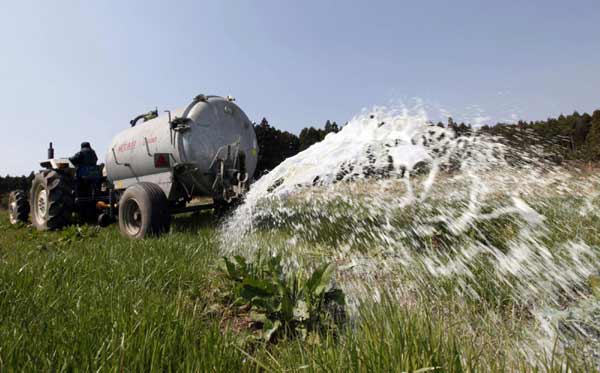Nuclear Meltdown
Consumers worry about fallout effects
By Tiffany Tan, Xu Fan, Shi Yingying and Zhang Xiaomin (China Daily)
Updated: 2011-04-17 07:46
 |
Large Medium Small |
|
 Dairy farmer Mutsuo Mito throws away milk freshly taken from his cows in his field, located about 50 km from the tsunami-crippled nuclear reactor, in Shinchimachi, Fukushima Prefecture, northern Japan, April 13, 2011. [Photo/Agencies] |
'Is seafood still edible after the Japanese nuclear leak?" a woman going by the name of bestgirl999 asked on Tianya.cn, one of China's most popular discussion forums. "I have a growing 1-year-old boy whose diet I wanted to supplement with salmon porridge, but I don't dare feed him that now.
"Pork and mutton contain 'lean meat powder', chicken meat is injected with hormones and I believe beef also has additives. I can go vegetarian, but how about my baby?"
One man replied: "I'm not eating (seafood) for at least two years."
Another said: "This is a more serious issue than just contaminated milk or 'lean meat powder.'"
This online exchange is only one of the countless that reflect the growing paranoia about the safety of food supplies following the partial meltdown of reactors at Japan's Fukushima Daiichi Nuclear Power Plant, which continues to discharge radioactive material into the air and the Pacific Ocean as we write.
The severity of the crisis has been upgraded to the worst possible rating on an international nuclear disaster scale, putting it on the same level as the Chernobyl incident of 1986.

Since the March 11 earthquake and the resulting tsunami that devastated Japan and damaged the power plant, traces of radioactive isotopes have been found in fish, vegetables and milk from communities around the nuclear plant.
Radioactive iodine has also been detected in the water supply of Tokyo, which lies 240 kilometers south of Fukushima.
Across the Pacific, in the United States, trace amounts of radioactive iodine have turned up in drinking water in Idaho, Washington and Tennessee. Minute levels of radiation have also been identified in milk samples in European countries such as Ireland, France and Greece.
In China, so much nearer, traces of radioactive iodine have been found in vegetables like spinach, asparagus, lettuce, cabbage and Chinese cabbage in 12 municipalities and provinces, including Beijing, Shanghai, Hunan, Guangdong and Hainan.
On the ground, in Shanghai, consumers are avoiding spinach. Zhang Lixiang, a stall-keeper in his early 30s, may be one of the last to be still selling that at Pudong's Qihelu Food Market and business is slow.
"This large wicker basket of spinach has been waiting for three days," says Zhang, pointing to a large pile of wilting vegetables. He says the Shanghainese started to worry about "nuclear radiation at their dining table" since the report of contaminated spinach in Beijing emerged earlier.
Sales of asparagus lettuce and green Chinese cabbage are slow as well.
Hui Lijie, a 55-year-old housewife whose main concern now is looking after the dietary requirements of her pregnant daughter, says she always thinks twice now before buying anything.
"Seafood is totally banned at our dining table as nobody knows how the currents will move the contaminated water. We've stopped eating spinach as well," she says.
"As for other vegetables, I buy only those grown in the greenhouse. Even then I soak them in clean water for at least half hour and add baking soda to neutralize the pesticide residue and whatever."
But Chen Zhenlou, a professor from the College of Resources and Environmental Science of East China Normal University, says: "Small amounts of contamination do not represent a public health hazard and all the talk about radioactive food in Japan, which earlier banned milk and other farm products from areas near the crippled plant, has made some people uneasy, even thousands of miles away."
He said the fearful reaction was "unnecessary".
Shanghai's local seafood markets are lucky not to be too affected, as supplies are mainly domestic. "We get seafood from Zhejiang, Jiangsu and Shandong," says Zhang Hengming of the Shanghai Tongchuan Seafood Market, one of the biggest in the city.
Import inspection and quarantine are being strictly enforced on food imports from Japan, according to Han Chunli from Shanghai Entry-Exit Inspection and Quarantine Bureau.
"We're following orders of the General Administration of Quality Supervision, Inspection and Quarantine and we have prohibited the import of dairy products, seafood and vegetables from five counties in Japan," she says. "Apart from that, we're now double-checking imported goods both on-site and in the lab."
The Ministry of Health has ordered administrators in 14 places in China, including Beijing, Shanghai and some coastal provinces, to test drinking water and food for radiation since the end of March. The European Union said it would tighten its own radiation limits for Japanese food imports and India said it would ban all food from Japan for at least three months.
Meanwhile, trace levels of radioactive iodine in the air have been detected in all but one province in China; cesium in 19 of the 31 provinces.
Since these discoveries, most Chinese have gone into defense mode. They've stayed away from imported Japanese food, the reported tainted vegetables as well as seafood, which they fear has absorbed radioactive particles released into the sea by the Fukushima nuclear plant.
Others have become more proactive, latching onto all imaginable advice about how to prevent radiation injury. Taobao, China's largest online retailer, has seen brisk sales of "anti-radiation" face masks and biohazard suits.
But is this concern and quiet panic justified? Our Sunday team decided to separate the facts from fiction.
Special Reports by Tiffany Tan, Xu Fan and Li Ye in Beijing, Shi Yingying in Shanghai and Zhang Xiaomin in Dalian.
| 分享按钮 |